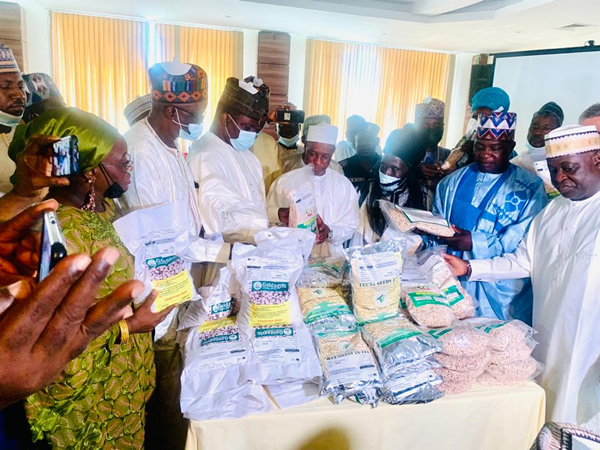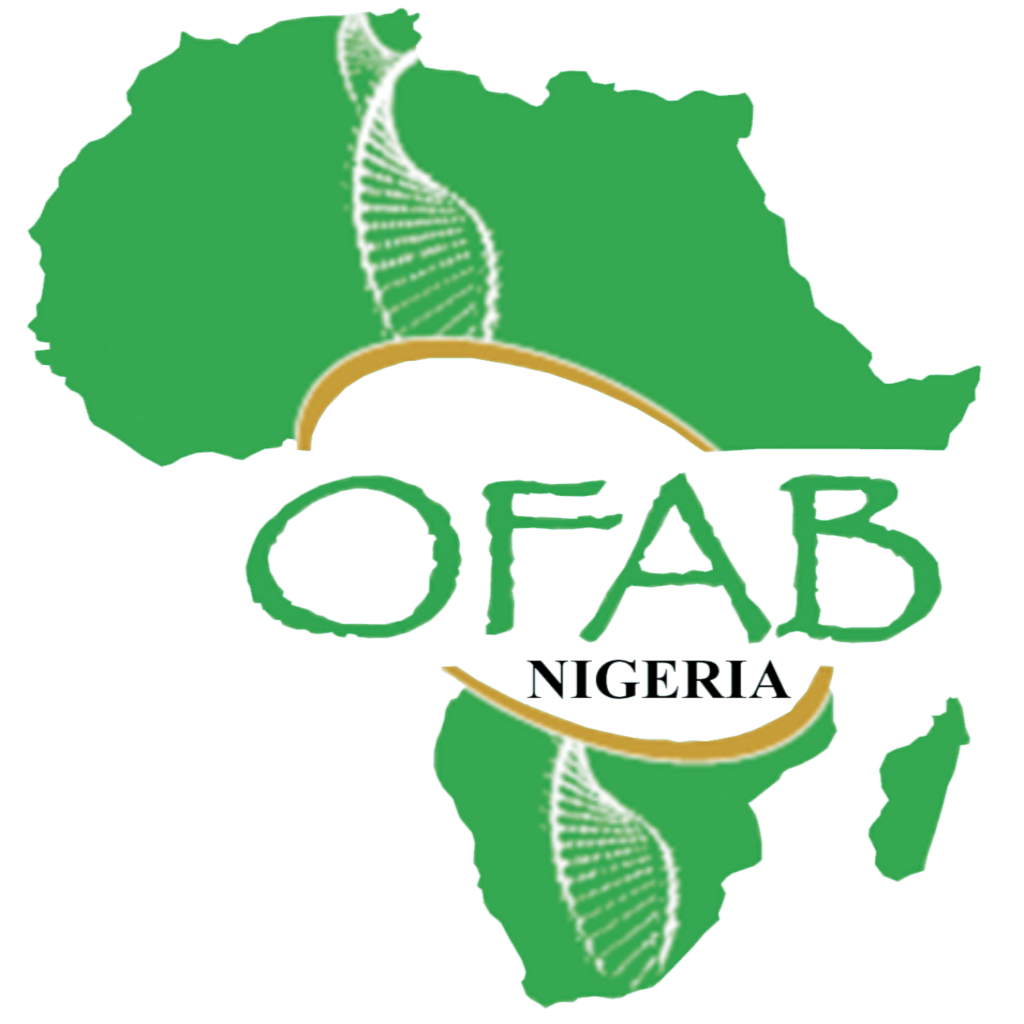
Officially, Nigeria has launched the Pod Borer Resistant (PBR) Cowpea for commercial production in the country. The African Agricultural Technology Foundation (AATF, the National Biotechnology Development Agency (NABDA) and the Institute for Agricultural Research (IAR), Zaria collaborated on this GM crop was named, registered and released by the National Varietal Release Committee as SAMPEA 20-T variety in Nigeria in December 2019. It’s Environmental release by the National Biosafety Management Agency, NBMA, certified the safety of the gene of insert. The commercialization of the transgenic Cowpea in Nigeria will help achieve food security, poverty alleviation and increase farmers’ income in the country.
Governor of Kano State, His Excellency, Abdullahi Umar Ganduje while unveiling the crop said agricultural productivity is at its low ebb ever, with farmers spending their scarce resources in controlling pests, insects and managing the degrading soil fertility using fertilizer. Sampea 20-T is a product of modern biotechnology. Nigeria is recognized as the first country in the world to release a cowpea variety that is resistant to Maruca, the destructive insect that had been a nightmare to farmers in the African continent. He said with the Bt Cowpea, there is hope that Nigeria will get food security. Governor Ganduje was represented by the Secretary to the State Government at event. His Jigawa State counterpart, His Excellency, Badaru Abubakar, Governor of Jigawa State in a good will message expressed pleasure over the unveiling of the SAMPEA 20-T and commended the efforts of the scientists who worked tirelessly to ensure the emergence of a product. He expressed hope about the deployment of science and technology being the answer to the restoration of the past glory of Nigeria.
Similarly, the Minister of Science & Technology, Dr. Ogbonnaya Onu, represented by the Director General/CEO, NABDA, Prof Abdullahi Mustapha said with the new discovery, Nigeria is now among the League of Nations using science and technology to address challenges, especially in agriculture. It is therefore obvious that if Nigeria, given its natural endowments, is to successfully transform her economy and take her rightful place in the comity of nations, Science and Technology and its integration in national socio-economic development processes must be accorded the highest priority.
The then Minister of Agriculture and Rural Development, Alhaji Sabo Nanono, represented by the Executive Secretary, ARCN, Prof. G. Sharubutu, expressed optimism that with the improvement in agricultural productivity, millions of people will be taken out of food insecurity and low-income status to food secured status with improved living standards. The development and release of Pod Borer Resistant variety of cowpea (Sampea 20-T), he said, will address the problem in a sustainable way. “I have been reliably informed that during the 2020 cropping season, on-farm demonstration trials of SAMPEA 20-T were conducted in 28 sites across Adamawa, Bauchi, Kaduna, Kano, Katsina, Zamfara, Kebbi, and Plateau states. Farmers who participated in the trials confirmed the agronomic superiority of Sampea-20T and the high yield performance of this variety resulted in high demand for seeds by farmers. This discovery has keyed perfectly into our desire to promote quick or early maturing crops in order to contain effect of COVID 19 pandemic so as to promote large scale stable food production.
“The key challenge ahead of us is to ensure steady supply of quality seed of this variety to the overwhelming farmers. This is because farmers buy seeds for the perceived benefits of higher yield, secured market and resistance to pests, which Sampea 20-T provides all. We must ensure quality at all levels of seed multiplication from the breeder to certified seeds and developed effective marketing and distribution strategy that will ensure the seeds reach each and every prospective farmer”, he asserted.
In a related development, the DG/CEO, NABDA, Professor Abdullahi Mustapha listed the role played by NABDA in the transgenic journey that birthed the Sampea 20-T. He said NABDA constructed the first Confinement Field Trial site, a requisite for compliance to Biosafety regulation, and again around 2010/2011, in collaboration with the African Agricultural Technology Foundation, Kenya, designed, constructed a level -2 containment facility, which was used for Biosafety containment studies at IAR, Zaria, where this project was developed. Also NABDA, with the support of the Ministry of Science and Technology also facilitated, funded and spearheaded heavily the Biosafety Bill passage process which took nearly six years at the national Assembly before its passage and subsequent assent by the President which led to the creation of the National Biosafety Management Agency (NBMA). This is in addition to the pockets of technical support from development partners like the AATF, USAID, USDA, PBS, AU-NEPAD/ABNE, Africa Harvest Biotechnology International (AHBFI), Nairobi, Bayer International, Crop Life International, USA etc. This action provided an enabling and friendly regulatory environment as required by the Cartagena Protocol on Biosafety which Nigeria signed and ratified in 2001/2002. Without this, Nigeria couldn’t have commercialized any genetically modified crop.
The out-going Executive Director of AATF, Dr. Denis Kyetere said he was particularly excited over the launch the PBR Cowpea. The new cowpea variety, SAMPEA 20-T, can produce higher yield than the conventional varieties, with reduced use of pesticides by farmers from eight times per cropping season to only two, he said. It can drastically improve cowpea production in Maruca-endemic areas and in Nigeria most cowpea producing areas are highly infested by this destructive insect pest.
The Executive Director, Institute for Agricultural Research, Ahmadu Bello Zaria, Professor Mohammad Ishiyaku disclosed that with the new cowpea variety (SAMPEA 20-T), Nigeria stands to save N2.1 billion annually.
For the General Development Officer and Biotechnology Specialist at USAID, Dr. Faith Tarr, this achievement advances Nigeria’s capacity to harness science, technology and innovation to sustainably improve livelihoods and nutrition. It also demonstrates that research investments can support innovation systems to deliver a pipeline of new tools and approaches that improve agriculture, food security, and resilience in the face of complex, dynamic challenges that Nigeria may face in the future.
Also speaking at the event, the President, All-Farmers Association of Nigeria (AFAN), Architect Kabiru Ibrahim said about 8 million Nigerian farmers and their families will benefit directly from cultivating the newly launched pod borer resistant cowpea variety called SAMPEA20-T.
The Event also marked ceremonial distribution of the new Bt Crop by seed companies present at the Launch. Other participants in the programme are: His Royal Highness, the Emir of Bichi represented by the Falakin Bichi, Alhaji Abba Wada; the DG/CEO, National Agricultural Seed Council of Nigeria(NASCN), Dr Olusegun P. Ojo; the Executive Director, IAR & Principal Investigator, Bt. Cowpea Project; Dr. Lawrence Kent, Bill & Melinda Gates Foundation, Seattle, USA; Dr Donald Mackenzie, Director, Danforth Plant Science Centre, Missouri, USA; Dr. Thomas J. Higgins, Commonwealth Scientific and Industrial Research (CSIRO), Australia; the Regional Director, AATF West and Central Africa, Abuja & Bt. Cowpea Project Manager, Dr Issoufou Kollo Abdourhamane; the Country Coordinator, Programme for Biosafety Systems(PBS), Dr Mathew Dore; Country Coordinator, OFAB Nigeria Chapter, Dr. Rose Maxwell Gidado; the Permanent Secretary, Ministry of Science, Technology and Innovation(STI), Kano, Dr. Binta Bala; the President, All Farmers Association(AFAN), Architect Kabir Ibrahim and Directors from Federal Ministries/Parastatals; Seed Companies; Farmers, NGOs, the media etc.

